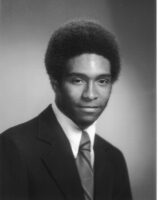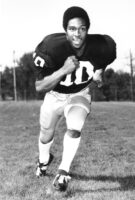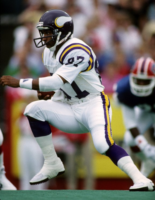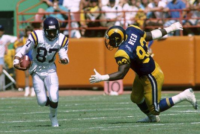Inductees
Dr. Leo Lewis III

Born: September 17, 1956
For the sons of successful pro athletes, it’s often a challenge to emerge out of the enormous shadows of their dads.
Fortunately, Leo Lewis III carved out quite a football career for himself, with a lineage from Columbia Hickman High School, on to the University of Missouri and then the National Football League’s Minnesota Vikings, where he spent 24 years — including 11 as a player.
He was a success at every stop, and it’s why the Missouri Sports Hall of Fame proudly inducted Lewis III with the Class of 2019.
His induction coincides with the induction of his late dad, Leo Lewis, Jr., a star running back for Lincoln University and in the Canadian Football League.
“Dad was an inspiration to me because he was there to guide me and keep me on task regarding getting an education and graduating from college,” Lewis III said. “He and my mother (Doris, who passed away in 1980) were more concerned about my education than my athletic achievement.”
After leading Columbia Hickman High School to a state championship in 1974, Lewis was a four-year letterman at Mizzou. He is the only player in Mizzou history to lead the Tigers in punt returns for four consecutive years and holds the school record for punt returns in a game (7) and most combined kick returns in a game (9).
Lewis III then played professionally 13 seasons, including 11 seasons (1981-1991) with the NFL’s Vikings. In fact, he was part of four Vikings playoff teams in the 1980s and later served as their Director of Player Development and as a pro scout from 1992 to 2005.
Naturally, coaches were great mentors. Among them was Vikings coach Bud Grant, who had coached his dad’s career with Winnipeg of the CFL. Others were Hickman coach Tom Travis, Mizzou coach Al Onofrio, and Jerry Burns, who later became the Vikings’ coach.
Travis moved him to quarterback at Hickman for his junior and senior seasons. At the time, Hickman was running the veer offense, and Lewis III not only had wheels but also an arm.
“It was indeed a leadership position as well and set me up for other situations that required me to be a leader,” said Lewis III, who also handled punts, kicked extra points and returned punts, earning All-State as a junior. “Onofrio then took a chance on me by giving me a scholarship to play at Missouri. I was going to college eventually, but to be able to play at that level was a blessing.”
Recruited by Tulane and Wyoming – but not recruited heavily by his own dad, then the coach at Lincoln – Lewis III chose Mizzou.
“When you grow up in Columbia, you are very impressed with the Mizzou campus and notoriety in town,” Lewis III said. “It was great to play there and be recognized as a local product.”
It’s remarkable, too, that Lewis III enjoyed such a long career in the NFL. After all, he was not drafted after his final season at Mizzou. He did sign a pro contract with the St. Louis Football Cardinals and participated in their 1979 camp. The next year, he played for the CFL’s Calgary Stampeders.
“There is no doubt that Bud Grant and Jerry Burns (former Winnipeg assistant) made it possible for me to land at the Vikings, despite cutting me the first year,” Lewis III said. “Bud’s relationship with Dad was significant. However, I still had to perform.”
In working with the Vikings’ front office under coach Dennis Green, Lewis III headed up programs that helped players transition out of the NFL and provided education to position them better financially. His department was named the best in the NFL in 2000.
Lewis III later served as an associate athletic director for the University of Minnesota (2005-2014) and the A.D. of Minneapolis North High School (2014-2017). He credits his former wife, Benita, children Lauren and Lindsay as well as partner Stacy for success post-football. He also runs the Lewis Sports Foundation, which provides grants to youths, schools and administrators.
“Both of my parents were career educators, but my mother and I had a special bond because she made me more accountable to my life choices,” Lewis III said. “Both were intent on stressing the value of educational attainment, but I owe it to her for giving me motivation for my academic pursuits. I think of her often in my lifelong educational career.”



